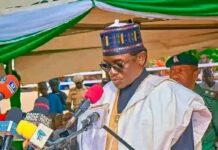From whichever angle you are coming to town, something magical will rivet your attention 10 kilometres away from Biu: a series of impregnable hills rising hundreds of feet above sea level. Biu is a fortress town that sits majestically south of Borno on a plateau replete with precipitous escarpments.
Traditionally pronounced as Viu, Biu is the first city of the Babur/Bura ethnic group and the second most significant urban centre and largest local council in the embattled Borno State, northeastern Nigeria. It is also a provincial hub of commerce and cultural renaissance, and has played a premier role since 1918 when the British colonialists created Biu Division. Currently, it serves as the headquarters of Biu Emirate, comprising of three other local governments: Bayo, Hawul, and Kwaya-Kusar.
The emirate, whose roots can be traced to 1535, is presently made up more than 50 communities across four local governments, with an estimated population of a million people. Majority of its inhabitants are farmers, and among its agricultural produce are guinea corn, maize, millet, rice and groundnut.
Historically, Biu people are peace loving, which explained why the previous capitals of Biu, in the ancient times were relocated, especially because of war and plague. Each time their existence was threatened, the locals would look for a new location on top of a hill. At last, the Biu forefathers chose its present location situated on a plateau, 193 kilometres from the state capital Maiduguri.
According to Bukar Usman, a retired permanent secretary in the Presidency and an indigene of Biu, Whenever it became necessary to relocate the capital to a new site, hunters were usually sent out to scout for the new site. The hunters considered certain factors before recommending a site; those factors include safety, suitability for agricultural production, and ease of access to water.
The safety yardstick was often met by building the new capital on a hill. In the case of Biu town, a plateau was chosen, which was why it was referred to as Viu (something high up). Biu town and the emirate are still where the hunters had chosen on a largely volcanic plateau, dotted with many flat-topped hills.
Just as in the olden days when warring neigbours found it difficult to penetrate Biu, the town has remained impregnable till date, having defied attempts by the Boko Haram insurgents to seize it not too long ago.
One of the major reasons that accounts for this is the towns topography. Biu is a 766-metre elevation above sea level. Its altitude is heightened by the fact that no other city around it is so loftily positioned. This vantage visibility has enhances its security such that, whichever route an intruder is coming from, the security agents will be viewing him from the hilltop and repel attacks in devastating fashion.
On approaching the T-junction leading to Biu Town along Gombe Road, when this reporter, a first-timer to Biu, visited the historic town, an unusual long queue of vehicles waiting to be cleared to enter the town at a record slow pace was seen. After waiting for what seemed like eternity, it was finally the turn of the taxi conveying us to be given a sign to come forward.
Instead of gun welding soldiers at the checkpoint, a group of stern looking youths in mufti waved down the vehicle, peeping through the glasses to see the occupants within. I was to learn they were the Civilian Joint Task Force, a group of volunteers from the town and others on the payroll of the government to complement the efforts of the army protecting the ancient town.
For they could easily recognise indigenes of Biu Town, as well as any strange face coming to town better than the soldiers, they were always the first security men to be encountered. Working in concert with the military, they will alert the soldiers ahead of a possible menace and join in intercepting it. Their vehicles are also permanently stationed at the T-junction where the monitor every movement coming to or going out of town.
Lest you forget, Biu is accessible by road through Gombe (Gombe State), Damaturu (Yobe State), Maiduguri (the state capital), Numan and Yola (Adamawa State). But, because of the poor state of the roads, travellers are likely to spend at least two and half hours on the shortest route. But this is compensated with an arresting landscape on arrival.
Until this year, town after town in Borno fell to Boko Haram in its determined drive to establish an Islamic caliphate. Buoyed by its string of successes, it decided to attack Biu on Wednesday, January 14, 2015. But it was one mistake too many as it ended in an unprecedented massacre for the insurgents.
Umar Midala, a schoolteacher and an indigene of Biu, was still enjoying his early morning sleep on that unfaithful day when he was roused from slumber by his sister as gunshots rent the balmy air, shattering the serenity of the somnolent town.
Recalling the anxious moment, he told Sunday Sun: When I woke up, I heard a cacophony of gunshots and rockets. It was scary. I quickly left our zinced house and ran for shelter at my grandmothers mud house, which would, naturally, offer better protection from bullets. There was confusion everywhere as people ran helter-skelter.
Unknown to Midala, the booms of rockets and gunshots were not few metres away as he had feared. The attack was happening on the outskirts of the city. But the echoes were deafening, sowing terror into the hearts of not just the fainthearted but most of Bius inhabitants who were used to quietude.
To show how daring the insurgents were and as a way of sending Biu residents panicking, Boko Haram decided to attack a military base near an army barrack via a detour from Garkida-Yimirshika-Biu Road. Deploying rockets and operating heavy weapons mounted on vans, the daredevils, numbering over a hundred, took the military base unawares about 6 oclock in the morning, attacking with ferocity. The soldiers fired back.
But the soldiers were not the only ones incensed by Boko Harams surprise attack. In the twinkling of an eye, the locals had mobilised. Numbering over one thousand and armed with any dangerous weapon they could lay their hands on, Biu youths rushed to intercept the intruders.
Early on November 1, 2014, about 42 Boko Haram fighters were killed by the Civilian JTF from Biu who saw about 50 Boko Haram fighters hidden under a truck conveying sheeps and goats. Reports had it a combined team of military officers and members of the Civilian JTF pursued the insurgents to Gur area, around Mandafuma village, where they engaged them in a fierce battle, which lasted for about two hours, overpowering them. The victorious Civilian JTF, it was gathered, displayed the heads of their victims as the returned to Biu amid fanfare to show the people the insurgents were human after all, and nobody should fear them.
Umar Mustapha, a youth from Biu told Sunday Sun why the youths are united in countering Boko Haram: Biu is an educated society. In fact, it was the first place in Borno State that the British established a missionary school, which accounts for why we were the first set of people in the state to attend western education.
Because of the high number of educated elite in Biu, it is difficult for our people to embrace Boko Haram, for we can easily draw the line between what is right and wrong. Members of Boko Haram are often illiterates. We cherish civilised values, and our people were not prepared to surrender these values to what Boko Haram represents.
For three hours in January last year, the gun battle continued unabated, as the Biu plateau quaked. When the guns went silent, about 78 bodies of Boko Haram insurgents lay dead. Two anti-aircraft guns were captured from the terrorists during the operation. The soldiers and the locals were euphoric with victory.
Recounting the swansong on the Biu plateau, Midala told Sunday Sun: The corpses of Boko Haram fighters littered everywhere. The only survivors were some of those who drove the vehicles.
Initially, when Boko Haram uprising started, it began as an opposition to government for abdicating its responsibilities, and you could find a number of Biu indigenes among the fold, who thought they were fighting a righteous cause, he told Sunday Sun.
But on realising that Boko Haram was all about mindless killings and a group without a clear-cut ideology, most of Biu people who joined the insurgency quickly withdrew. The remaining ones, who still identified with Boko Haram, instantly became victims of jungle justice to serve as deterrence to others. Today, you wont find anybody from Biu who is a member of Boko Haram, said Mustapha.
The bitter lesson meted out to Boko Haram in Biu did not go down well with the insurgents, leading to a bizarre aftermath. In the wake of the disastrous rout, Boko Haram decided to hunt down anybody from Biu who they came across, irrespective of whether you were a Muslim or not. Before the military cleared the remnants of the insurgents from Bius environs, each time they blocked the assess roads to Biu, on learning that you were from the town, they would kill you. For Biu and Boko Haram, there is no love lost.
Since its failed attack on Biu last year, Boko Haram has come to dread the town like a leprous patient. The near decimation of its fighters who embarked on that unfaithful mission has sent shill down their spines, and it was an experience it wouldnt like to relive in a hurry.
Unfortunately, the aftermath of Boko Haram’s failed intrusion to Biu is still being felt. Scared for their lives, majority of Igbos and Yorubas, predominantly the traders in Biu town, who sell motor parts and other goods, have fled Biu. The gaps left are yet to be filled.
Mustapha explained why: Biu people are predominantly farmers. All we know is go to school, come back, and go to farm. The businesses were run by Igbo and Yoruba traders. Though Biu is peaceful, the traders who left have refused to come back. Now, our people are learning how to sell those things they used to sell. But it has never been easy.
For the two days this reporter stayed in Biu, peace and tranquility were evident such that a visitor would begin to wonder he was in another state outside the embattled Borno State. The relative peace in Biu was also enhanced by the fact that everybody is security conscious. Every corner of the town you go to, you will see members of the eagle-eyed Civilian JTF nosing for possible threats.
The inhabitants are not left out. Even without doing it consciously, they assess a visitor from a distance. Unlike other parts of Borno with mixed ethnic groups, the harmony in Biu has been enhanced by the close-knit bond existing among family members.
Alhaji Mohammed Usman, 85, told Sunday Sun why peace has continued to reing in Biu and why it is difficult for Boko Haram to extent its tentacles to the town: It is a single ethnic group, Babur/Bura, and almost everybody in Biu is related. It is like one family, so you dont expect your family members to partake in killing one another.
In the olden days, said the grandpa, when enemies rode on horses to attack Biu, the hunters would run back to alert the emir. Without wasting time, the people would run to the surrounding hills leading to the town and begin hurling stones at them and, most times, they would hurriedly withdraw.
Princess Hajia Aminat is the first daughter of late Mohammed Aliyu, the 24th emir of Biu. She held the view of blood being ticker Usman than water: Biu doesnt have a culture of violence. Everybody knows each other, and most people here are blood relations. Peace will continue to exist in Biu.
Aside the natural bulwark provided by Bius hilly location, the homogeneity of the people and love for peace and education, there is another factor accounting to the non conquest of Biu by the insurgents: spiritual.
According to Midala, who is also a historian, the founding fathers of Biu made a spiritual proclamation that, on no account should Biu be conquered by enemies. His view is in tandem with that of Bukar Usman in his definitive book, A History of Biu, where Biu is presented as an oasis in the midst of Sahara.
Sadly, social and cultural activities have almost grinded to a halt in Biu. To forestall the insurgents from infiltrating Biu in the guise of being participants in cultural activities or detonating bombs in gatherings, the annual durbar have been kept on hold, just like in many places in the state. However, there are indications that, with the restoration of normalcy in many parts of the state, cultural enthusiasts in Biu will soon have their faces creased with smiles.
Just last Saturday, the Biu-Damaturu Road, which had been shut for three years because of the sordid activities of Boko Haram, was reopened, having been cleared of the insurgents. Accompanied by soldiers and the civilian JTF, the first set of commuter buses rode into town, to the cheers of residents, thus opening all the access roads to Biu to commuters.
In life, everybody pays a price. No doubt, peace in Biu has come with a price self-sacrifice and resilience. For Boko Haram, the 78 corpses on the Biu plateau last January were a price to pay for misadventure.
Follow the Neptune Prime channel on WhatsApp:
Do you have breaking news, interview request, opinion, suggestion, or want your event covered? Email us at neptuneprime2233@gmail.com




